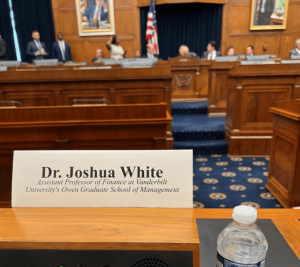By Lacie Blankenship
Joshua T. White, Assistant Professor of Finance and Brownlee O. Currey Jr. Dean’s Faculty Fellow at Vanderbilt Owen Graduate School of Management, was invited to testify before Congress in Washington D.C. on Thursday, July 13.
“Currently, the House Financial Services Committee is considering several legislative proposals aimed at overhauling the proxy process and protecting the interests of investors,” White opened his prepared testimony.
“Investor-related issues are paramount for ordinary Americans who put their hard-earned money into public equities to achieve financial objectives. These goals often include home purchase savings, funding their children’s college education, or creating a retirement savings capable of keeping pace with inflationary trends.”
White testified before the Subcommittee on Capital Markets of the House of Financial Services Committee in the hearing entitled “Reforming the Proxy Process to Safeguard Investor Interests.”
In his testimony, White outlined 3 critical challenges related to proxy voting and their potential impact on investor interests.
The growing trend of Environmental, Social, and Governance (ESG) initiatives
“The proliferation of these proposals by special interest groups has intensified while shareholder support has drastically declined,” White said. “My analysis indicates that this trend largely results from changes in SEC Staff Guidance towards no-action relief implemented in 2021, with the costs ultimately falling on all shareholders, including retail investors.”
The influence and role of proxy advisory firms

White provided a photo from his perspective at the hearing held in the Rayburn House Office Building.
“The substantial influence of proxy advisory firms on asset manager voting and corporate behavior can sometimes deviate from maximizing shareholder value,” White said. “Proxy advisory firms have a large influence on voting outcomes due to concentration of market power and the propensity for some institutional investors to predominantly follow all their voting recommendations.”
The potential impact of E&S-based rules
“I note that the SEC is considering implementing E&S-based rules that many argue would require non-material information disclosure,” White said. “The repercussions of such mandates could impact companies deciding whether to go or remain public, the cost of capital formation, and the scope of retail investment opportunities.”
White believes the above issues are imperative for protecting investor interests. Read more about the reforming proxy voting process hearing and the testimonies from all the witnesses on the Financial Services Committee website.
Vanderbilt University faculty, staff, and students who speak in Congressional hearings represent themselves as individuals and do not speak on the institution’s behalf unless specified otherwise.